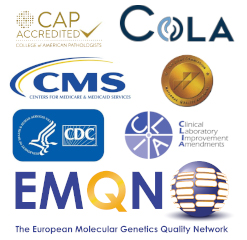Ovarian Cancer
WHY WE’RE DIFFERENT
EXCLUSIVE PARTNERS
- Perkin Elmer
- Sngene Lab
- Genique lifesciences

Ovarian Cancer
Ovarian cancer is the eighth most common cancer affecting women worldwide. [1] There are three types of ovarian cancer:
- Epithelial tumours which are the most common type (account for about 90% of ovarian cancers) and is cancer that starts in the cells lining in the surface layer (epithelial) of the ovary.
- Germ cell tumours that arise from cells which produce eggs. This type of ovarian cancer is rare and accounts for ~5% of ovarian cancers.
- Stromal cell and other rare types including sex-cord stromal cell ovarian cancer, stromal tumours and sarcomas.
Although each subtype behaves differently, most patients receive standard treatment consisting of surgery to remove as much of the tumour as possible, followed by chemotherapy. [2] Despite high initial response rates towards chemotherapy, approximately 70% of all patients succumb to recurrent resistant disease within five years after diagnosis, with a five-year survival rate of 45%. [1,2] This is where genomic testing can help.
How can Genomic Testing Benefit Me?
Cancer is a complex disease, caused by a wide range of genetic mutations that can be present in many combinations. Each tumour has a unique genetic makeup, even amongst cancers of the same tissue type, such as ovarian cancer. Genomic testing can be used to analyse the DNA of your tumour and may identify the genetic mutations that are unique to your cancer.
Identifying the mutations in a patient’s cancer is the key to developing personalized treatments. Clinical trials have shown that personalized therapies, developed from genetic testing of tumors, are the most effective way to improve treatment outcomes. Patients undertaking therapy as a result from genetic testing are shown to have longer progression-free, higher response rates to treatment and overall greater survival rates. Investing in genomic testing to obtain a complete and accurate diagnosis, is small compared to the time and money that may be wasted on generic or ill-chosen therapies. Genomic testing provides a powerful diagnostic tool, and every patient deserves an accurate diagnosis.
The power of genomic testing in Ovarian Cancer
Depending on the type of testing done, a comprehensive genomic analysis may provide information on potential therapeutics, development of resistant to treatments, prognosis, disease tracking, and may provide access to clinical trials and new treatments based on the genetic mutations identified in your tumour. Genomic testing of your tumour may identify:
- BRCA-mutations, which may be treated with PARP inhibitors (PARPi). PARPi selectively target BRCA-deficient cancer cells while sparing normal tissues, which retain a normal copy of the BRCA gene, and have shown effectiveness in BRCA-mutated ovarian carcinoma. [3,4]
- BRAFmutations in low-grade serous ovarian carcinomas, which may be effectively treated with BRAF
- Resistance to chemotherapy in ovarian cancer patients has shown to be associated with inactivating gene breakages at the level of the tumour suppressor genes RB1, NF1, RAD51B and PTEN, which may help guide treatment choices. [5]
- Various studies suggest that high-grade serous ovarian carcinomas with overexpression of the CCNE1may represent a tumour subset, potentially responsive to therapies with CDK inhibitors, AKT inhibitors or proteasome inhibitors. [5]
What Genomic Testing Options are Available to me?
- BRCAmutations increase the risk of developing breast and ovarian cancer. Around 15% of ovarian cancers are caused by BRCA Our BRCA Plus panel covers both the BRCA1 & BRCA2 tumour suppressor genes, as well as 10 other genes commonly involved in breast and ovarian cancers – ATM, CDH1, CHEK2, NBN, PALB2, RAD51C, RAD51D, RAD51IL3-RFFL, SMARC4 and TP53
- For patients currently diagnosed with ovarian cancer, BRCAPlus Somatic testing can be performed on a tumour sample and may detect mutations in the BRCA If mutations are detected, this may offer information on alternative drug therapies and clinical trials.
- BRCAmutations are often germline, meaning they are in all cells in your body and may be passed down to your children. If there is a family history of ovarian cancer, or BRCA mutations, this can increase your risk of developing ovarian and breast cancer.
- BRCAPlus Germline testing can be performed on a blood sample which may indicate if there is a germline mutation in the BRCA gene. If the mutation is germline, family members can be tested to see if they have also inherited the mutation, allowing earlier detection and prevention.
Codex Pro Plus Solid Tumour Analysis
- The Comprehensive PlusSolid Tumour Analysis is a comprehensive cancer panel that may detect DNA mutations and RNA fusions across >120 genes that are commonly indicated in a range of cancer types.
- Your personalized report will provide you with the genetic characteristics of your tumor, which may provide information on potential therapeutics, resistance to therapeutics, prognosis and clinical trialsor new treatments you may be able to access.
- This analysis also covers Copy Number Variations and Tumour Mutational Burden, which can indicate your likely response to Immune Checkpoint Inhibitors.
Cell-Free Tumour DNA (ctDNA) Testing and Tracking
- Tumours may release small fragments of DNA (ctDNA) into the bloodstream, which may contain identical mutations to those identified in the primary tumour.
- As ctDNA is released into the bloodstream, this allows for a liquid biopsy to be performed from a blood draw. This may eliminate the need for invasive procedures to obtain samples, such as biopsies, which can be painful for patients or may not be possible due to the size or location of the tumour.
- ctDNA can be tracked over time to monitor your response to treatment and the development of resistance to treatment. ctDNA testing can also be used to check for residual cancer following treatment and can reflect tumour size and burden more accurately than other diagnostic techniques.
References
- Cancer global consortium. (2019). Ovarian cancer: know the facts.
- Liefers-Visser, J. A. L., R. A. M. Meijering, A. K. L. Reyners, A. G. J. van der Zee and S. de Jong (2017). “IGF system targeted therapy: Therapeutic opportunities for ovarian cancer.” Cancer Treat Rev60: 90-99.
- Lee, J. M., J. A. Ledermann and E. C. Kohn (2014). “PARP Inhibitors for BRCA1/2 mutation-associated and BRCA-like malignancies.” Ann Oncol25(1): 32-40.
- Benafif, S. and M. Hall (2015). “An update on PARP inhibitors for the treatment of cancer.” Onco Targets Ther8: 519-528.
- Testa, U., E. Petrucci, L. Pasquini, G. Castelli and E. Pelosi (2018). “Ovarian Cancers: Genetic Abnormalities, Tumor Heterogeneity and Progression, Clonal Evolution and Cancer Stem Cells.” Medicines (Basel)5(1).
